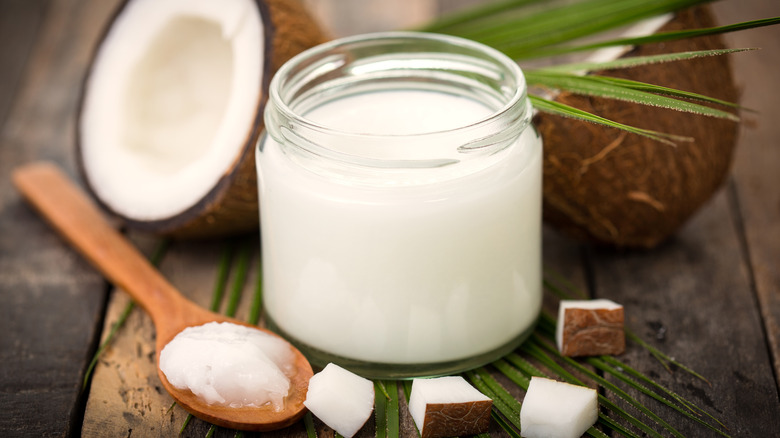Read This Before Adding Coconut Oil To Your Diet For Weight Loss
For years now, the debate about whether coconut oil is healthy or unhealthy has been raging on. While many are convinced that incorporating more coconut oil into their diets will add a slew of benefits, science has noted something entirely different. According to Stat News, coconut oil as a health food first started making waves after two medical articles published by Marie-Pierre St-Onge, a professor of nutrition at Columbia University, caught the eyes of folks.
In St-Onge's study, it was noted that a diet that consisted of 100 percent medium-chain fatty acids could provide weight loss benefits for those trying to shed some extra pounds. What is conveniently omitted from articles promoting the use of coconut oil is that this oil only contains 14 percent medium-chain fatty acids (nowhere close to the 100 percent required for weight loss, according to St-Onge's studies). With that in mind, what exactly does science say about coconut oil? Is it truly healthy and can it actually help you lose weight?
While the science is inconclusive, you should still err on the side of caution
According to Healthline, coconut oil isn't everything it has been cracked up to be and might actually not aid you in losing weight. Coconut oil possesses something called medium-chain triglycerides (or MCT's), which help folks feel fuller, but citing it as a MCT-rich oil has come with some controversy due to its makeup. Typical MCT's like olive oil and nut butter are comprised of compounds like capric, caprylic, caproic, and lauric acid. Why are MCT's good for you?
Well, the body absorbs them much quicker than their LCT (long-chain triglycerides) counterpart and also has a lower chance of being turned into body fat. Where does coconut oil fit into this? Healthline explains that coconut oil possesses many of the necessary compounds to be considered a MCT, but often performs like a LCT when it comes to digestion. Because of this, coconut oil is viewed as something that titters the thin line between healthy and unhealthy. Medical News Today notes that while more research is needed, studies have produced inconclusive results thus far.

